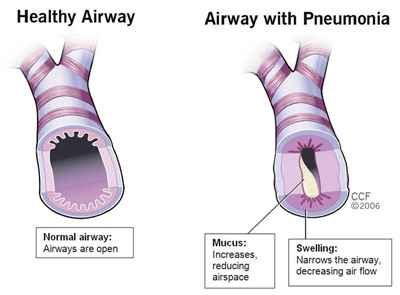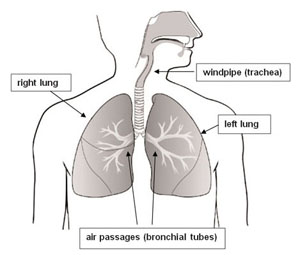Back Conditions Explained
Pneumonia

We have selected the following expert medical opinion based on its clarity, reliability and accuracy. Credits: Sourced from the Cleveland Clinic, Ohio. Please refer to your own medical practitioner for a final perspective, assessment or evaluation.
Overview
What is pneumonia?
Pneumonia is an infection in one or both of your lungs that can be caused by several kinds of germs, such as:
- Bacteria
- Viruses
- Fungi (molds) (uncommon)
Pneumonia causes swelling (inflammation) of the airways and causes air sacs in the lungs to fill with mucus and other fluids, making it difficult for oxygen to reach the blood.

What are the more common types of pneumonia?
Bacterial Pneumonia: Bacterial pneumonia is caused by bacteria. The streptococcus pneumoniae germ is the most common cause of bacterial pneumonia.
Viral Pneumonia: Viral pneumonia is caused by virus germs. About half of all people with pneumonia have viral pneumonia. Viral pneumonia is usually less serious than bacterial pneumonia.
How Your Lungs Work
Your lungs' main job is to get oxygen into your blood and remove carbon dioxide. This happens during breathing. We breathe 12 to 20 times per minute when we are not sick. When you breathe in, air travels down the back of your throat and passes through your voice box and into your windpipe (trachea). Your trachea splits into two air passages (bronchial tubes). One bronchial tube leads to the left lung, the other to the right lung. For the lungs to perform their best, the airways need to be open as you breathe in and out. Swelling (inflammation) and mucus can make it harder to move air through the airways, making it harder to breathe. This leads to shortness of breath, difficulty breathing, and feeling more tired than normal.

Symptoms
What are the signs and symptoms of both bacterial and viral pneumonia
Bacterial Pneumonia
Symptoms of bacterial pneumonia can develop gradually or suddenly.
Symptoms include:
- High fever (up to 105 degrees)
- Tiredness (less energy)
- Rapid breathing
- Chills
- Cough with mucus (might be greenish or have blood)
- Chest pain, especially with coughing or deep breathing
- Shortness of breath
- Loss of appetite
Viral Pneumonia
Symptoms usually develop over a period of several days.
Early symptoms are similar to flu symptoms, which include:
- Fever
- Dry cough
- Headache
- Sore throat
- Loss of appetite
- Muscle pain
Additional symptoms about a day later:
- High fever
- Cough with mucus
- Shortness of breath
Management and Treatment
What is the treatment for pneumonia?
Bacterial Pneumonia
Bacterial pneumonia is usually treated with antibiotics. In some cases, the person may stay in the hospital for treatment.
Hospital treatments may include:
- Oxygen
- Fluids and medicines given through an IV
- Breathing treatments and exercises to help loosen mucus
- Medicines for pain and fever may also be helpful. With treatment, bacterial pneumonia usually improves within 24 to 48 hours.
Viral Pneumonia
Antibiotics are not used to fight viruses, but may be given to fight a bacterial infection that is also present. Hospital stays for viral pneumonia are less common than for bacterial pneumonia. Medicines for pain and fever may also be helpful. Other medicines and therapies such as breathing treatments and exercises to loosen mucus may be prescribed by your doctor. Symptoms usually begin to improve within a few days.
What should I do to get better if I have pneumonia?
- Finish ALL medications and therapies as they are prescribed.
- Drink warm fluids to relieve coughing.
- Rest. Don't rush your recovery. It can take weeks to get your full strength back.
You are the only one who knows whether you are feeling better. If at any time you feel worse, contact your healthcare provider right away.
Prevention
How can I prevent pneumonia?
Bacterial Pneumonia
Several pneumonia vaccines (shots) are available for protection against the most common causes of bacterial pneumonia. Ask your healthcare provider about these vaccines. Getting a flu vaccine (shot) once every year can also help prevent bacterial pneumonia.
Viral Pneumonia
Get a flu vaccine (shot) once every year. Flu vaccines are prepared to protect against that year's virus strain. Having the flu can make it easier to get bacterial pneumonia.
How to prevent bacterial and viral pneumonia
- Don't smoke, and avoid secondhand smoke.
- Wash your hands before eating, before handling food, when using the restroom, and after being outside.
- Avoid being around people who are sick. Ask them to visit when they are feeling better.
- Eat a healthy diet, exercise, and get enough rest.
- Tell your doctor if you have trouble swallowing.
- Get treated for any other infections or conditions that you have.
- Don't use alcohol heavily.
Prognosis
What is the outlook for pneumonia?
People who are otherwise healthy often recover quickly when given prompt and proper care. However, pneumonia is a serious condition.
You are at higher risk if you:
- Smoke
- Are over age 65
- Have a chronic illness, especially one that affects the heart, lungs, or kidneys (such as COPD, diabetes)
- Have a weakened immune system for any reason (such as from medication, cancer, or a transplant)
- Have trouble swallowing
- Have had a recent surgery or procedure
- Have pneumonia that doesn't get treated
_______________________________________________________________________________________________________________________
Are you a healthcare practitioner who enjoys patient education, interaction and communication?
If so, we invite you to criticise, contribute to or help improve our content. We find that many practicing doctors who regularly communicate with patients develop novel and often highly effective ways to convey complex medical information in a simplified, accurate and compassionate manner.
MedSquirrel is a shared knowledge, collective intelligence digital platform developed to share medical expertise between doctors and patients. We support collaboration, as opposed to competition, between all members of the healthcare profession and are striving towards the provision of peer reviewed, accurate and simplified medical information to patients. Please share your unique communication style, experience and insights with a wider audience of patients, as well as your colleagues, by contributing to our digital platform.
Your contribution will be credited to you and your name, practice and field of interest will be made visible to the world. (Contact us via the orange feed-back button on the right).
Disclaimer:
MedSquirrel is a shared knowledge, collective intelligence digital platform developed to share medical knowledge between doctors and patients. If you are a healthcare practitioner, we invite you to criticise, contribute or help improve our content. We support collaboration among all members of the healthcare profession since we strive for the provision of world-class, peer-reviewed, accurate and transparent medical information.
MedSquirrel should not be used for diagnosis, treatment or prescription. Always refer any questions about diagnosis, treatment or prescription to your Doctor.
